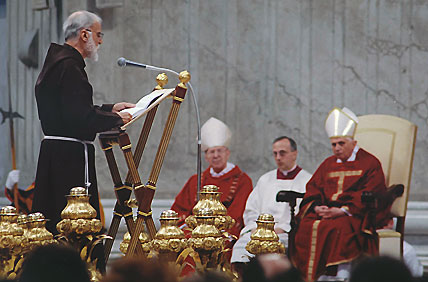OUR APOSTOLIC LIFE
Constitutions N. 146
- The Son of God was sent into the world by the Father so that, assuming our human condition and consecrated by the anointing of the Holy Spirit, he might bring the good news to the poor, heal the contrite of heart, proclaim liberty to captives, restore sight to the blind and proclaim the Lord’s favour.
- Christ established that this mission, by the power of the Holy Spirit, should continue in the Church, which welcomes it as a grace, as its own vocation and as the profound expression of its identity.
- This same Spirit raised up Saint Francis and his apostolic Fraternity so that following the example of Jesus and His first disciples they might go about the world preaching penance and peace, thus participating in the Church’s mission to proclaim the gospel.
- Our Fraternity, therefore, in obedience to the Spirit of the Lord and His holy activity, pays a debt of service to all peoples by bringing them the gospel in deeds and words in the Church.
Since 1753 the Apostolic preacher to the Papal Household has always been appointed from the Capuchin friars, Fr Raniero Cantalamessa OFMCap, being the current preacher. Below is the conclusion of his Good Friday Homily 2014:
Here is what the story of our brother Judas should move us to do: to surrender ourselves to the one who freely forgives, to throw ourselves likewise into the outstretched arms of the Crucified One. The most important thing in the story of Judas is not his betrayal but Jesus’ response to it. He knew well what was growing in his disciple’s heart, but he does not expose it; he wants to give Judas the opportunity right up until the last minute to turn back, and is almost shielding him. He knows why Judas came to the garden of olives, but he does not refuse his cold kiss and even calls him “friend” (see Mt 26:50). He sought out Peter after his denial to give him forgiveness, so who knows how he might have sought out Judas at some point on his way to Calvary! When Jesus prays from the cross, “Father, forgive them; for they know not what they do” (Lk 23:34), he certainly does not exclude Judas from those he prays for.
So what will we do? Who will we follow, Judas or Peter? Peter had remorse for what he did, but Judas was also remorseful to the point of crying out, “I have betrayed innocent blood!” and he gave back the thirty pieces of silver. Where is the difference then? Only in one thing: Peter had confidence in the mercy of Christ, and Judas did not! Judas’ greatest sin was not in having betrayed Christ but in having doubted his mercy.
If we have imitated Judas in his betrayal, some of us more and some less, let us not imitate him in his lack of confidence in forgiveness. There is a sacrament through which it is possible to have a sure experience of Christ’s mercy: the sacrament of reconciliation. How wonderful this sacrament is! It is sweet to experience Jesus as Teacher, as Lord, but even sweeter to experience him as Redeemer, as the one who draws you out of the abyss, like he drew Peter out of the sea, as the one who touches you and, like he did with the leper, says to you, “ I will; be clean” (Mt 8:3).
Confession allows us to experience about ourselves what the Church says of Adam’s sin on Easter night in the “Exultet”: “O happy fault that earned so great, so glorious a Redeemer!” Jesus knows how to take all our sins, once we have repented, and make them “happy faults,” faults that would no longer be remembered if it were not for the experience of mercy and divine tenderness that they occasioned.
I have a wish for myself and for all of you, Venerable Fathers, brothers, and sisters: on Easter morning, may we awaken and let the words of a great convert in modern times, Paul Claudel, resonate in our hearts:
My God, I have been revived, and I am with You again!
I was sleeping, stretched out like a dead man in the night.
You said, “Let there be light!” and I awoke the way a cry is shouted out!
(Excerpt taken from www.cantalamessa.org/?p=2347&lang=en)

